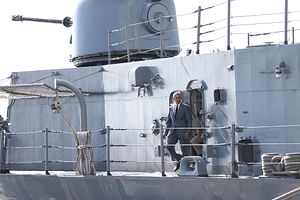The United States and the Philippines discussed boosting their alliance in a ministerial meeting in Washington, D.C. on January 12.
On Tuesday, Philippine Foreign Secretary Albert del Rosario and Philippine Defense Secretary Voltaire Gazmin met with their U.S. counterparts, Secretary of State John Kerry and Defense Secretary Ashton Carter, for the U.S.-Philippine 2+2 ministerial consultations. The meeting was just the second of its kind since the inaugural 2+2 was held back in 2012. It comes as both countries commemorate the 70th anniversary of the establishment of diplomatic relations.
As anticipated, the two sides discussed the full range of issues relevant to the alliance. In remarks following private consultations – which lasted more than two hours – Del Rosario said that the two sides had touched on ongoing defense and security cooperation, economic collaboration, and the threat of violent extremism.
On the defense side, the United States continues to play a critical role in Philippine military modernization necessary to counter a range of threats, including growing Chinese assertiveness in the South China Sea. U.S.-Philippine cooperation in this dimension got a boost this week with the Philippine Supreme Court finally approving the Enhanced Defense Cooperation Agreement (EDCA) which both sides initially signed in April 2014 (See: “Philippine Court Upholds New US Defense Pact”). As Carter put it in remarks before private consultations, the EDCA decision gives the United States and the Philippines “new opportunities” in this area as they move forward on implementing the agreement.
On economics, as Del Rosario noted in his comments, both sides have been able to resolve many issues that previously tempered the growth of trade ties, including the termination of a Generalized System of Preferences (GSP) review on labor rights, the removal of the Philippines from the Special 301 Watch List on intellectual property rights, and the reinstatement of the Philippines to Category 1 status under the Federal Aviation Authority (FAA), which allowed its airlines to operate new direct flights to the United States. But both sides also looked to the future of their economic relationship. In terms of foreign assistance, the Philippines has been awarded a second Millennium Challenge Corporation compact following the first, which expires this May. Another agenda item discussed was the Philippines’ future entry into the U.S.-led Trans-Pacific Partnership (TPP) (See: “Confirmed: Philippines Wants to Join TPP”).
The inclusion of the threat of violent extremism on the agenda was not surprising. Fears continue to rise about the threat of the Islamic State in Southeast Asia, with the Philippines being a country of particular concern. In a video released last week, members of at least three different insurgent groups from the Philippines together pledged allegiance to the Islamic State’s leader Abu Bakr al-Baghdadi. While the groups had previously pledged allegiance to Baghdadi individually, their growing cooperation has sparked fears among some that the Philippines could become the satellite or hub of the Islamic State in Southeast Asia.

































